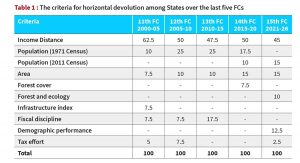Syllabus: GS-II
Subject: Polity
Topic: Federalism ,
Issue: Financial relation
Southern state have raised issue of not receiving proper share in financial devolution:
- Divisible pool of taxes are defined in article 270 of constitution divided as per recommendation of Finance Commission(Article 280)

Key issues
- Around 23% of Union government’s gross tax receipts are collected through Cess and surcharge, not shared with states.
- Variations exist in the amount each state receives back for every rupee contributed to central taxes. (Due to headquarter of corporations in few State capitals.)
- Higher weightage for equity and needs over efficiency.
- Grants-in-aid recommended by FCs vary among states, is based on population and area.
The way ahead:
- Enlarge the divisible pool by including a portion of Cess and surcharge, while gradually discontinuing various impositions to rationalize tax slabs.
- Increase weightage for efficiency criteria in horizontal devolution,
- Considering relative GST contributions from states.
- a more formal arrangement for states’ participation in the constitution and working of the Finance Commission, akin to the GST council.
- States should devolve adequate resources to local bodies for vibrant and accountable development, furthering the balance between equity and federalism.
| Prelims connect( meaning of different term used in Finance Commission formula)
· Income distance’ is the distance of a State’s income from the State with highest per capita income which is Haryana. · ‘Population’ is the population as per the 2011 Census.(from 15th FC) · ‘Forest and ecology’ consider the share of dense forest of each State in the aggregate dense forest of all the States. · ‘The demographic performance’ criterion has been introduced to reward efforts made by States in controlling their population. · ‘Tax effort’ as a criterion has been used to reward States with higher tax collection efficiency. |

